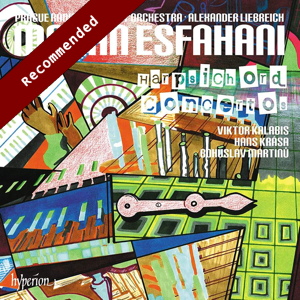
Bohuslav Martinů (1890-1959)
Concerto for harpsichord and small orchestra H246 (1935)
Hans Krása (1899-1944)
Kammermusik for harpsichord and seven instruments (1936)
Viktor Kalabis (1923-2006)
Concerto for harpsichord and string orchestra, Op.42 (1975)
Mahan Esfahani (harpsichord), Prague Radio Symphony Orchestra/Alexander Liebreich
rec. 2021, Studio S1, Czech Radio, Prague, Czechia
Hyperion CDA68397 [60]
Towards the end of the eighteenth century the piano largely replaced the harpsichord, except for a limited role in accompanying opera recitatives. However, in the twentieth century a revival began, spearheaded by the redoubtable Wanda Landowska, and a result new works started being written for the instrument, and the increasing interest in playing early music on instruments of the time was also an encouragement. There is a small but distinguished group of twentieth century harpsichord concertos, which includes works by Falla, Poulenc, Frank Martin and Walter Leigh. Here we have a group of three such works, all by Czech composers, and all requiring only chamber forces, as the harpsichord is a good deal less powerful than a concert piano.
Martinů is the best-known composer here, and his concerto has been recorded several times. It is a characteristic example of his concerto grosso style, with the soloist the first among equals. There are three movements, respectively fast, slow and fast. The two outer movements are rhythmically vital with that pungency and punch which one associates with the composer, while the slow movement features a really beautiful long melody for the soloist. There are cadenzas in the outer movements and the small orchestra includes a piano, whose timbre makes a striking contrast with that of the harpsichord. (I wonder whether hearing this work gave Elliott Carter the idea for his Double Concerto for harpsichord, piano and two chamber orchestras.) As well as much of Martinů’s customary cheeriness there are also darker implications. Esfahani considers the work one of the finest concertos for the instrument.
Hans Krása is best-known as being one of the Jewish composers who was interned at the Theresienstadt concentration camp and later murdered at Auschwitz. In the 1920s and 1930s he had considerable success with his relatively small number of works, of which the largest is the opera Verlobung in Traum, which was recorded as part of the celebrated Entartete Musik series by Decca towards the end of the last century. The work here is not really a concerto – Krása called it Kammermusik, like some of Hindemith’s small orchestral works – and the soloist is joined by an ensemble of seven instruments, including three sizes of clarinet, a saxophone and a trumpet. The work is vividly evocative of its period, notably of Kurt Weill’s theatre works and also Stravinsky’s Soldier’s Tale, with abrupt changes of mood and texture and several very Weill-like tunes. I am not sure that it is really integrated as a work, but it is very pleasant listening.
Viktor Kalabis came from the next generation of Czech composers and is yet to be widely known outside his home country. He has, however, been fairly well recorded, and also reviewed on MWI, and here is a link to a collection of his symphonies and concertos and here is one to another group of his works, including a set of his string quartets. He was a great admirer of Martinů and served as President of the Martinů Foundation. His wife was the harpsichordist Zuzana Růžičková, for whom he wrote his concerto. It is by some way the longest work here and, as one would expect, very much in the Martinů idiom. There are three movements and the fast outer ones could almost be by Martinů. The middle one is, however, melancholy is a rather Bartókian way. This is the first work by Kalabis I have heard, and I do not yet have a sense of his distinctive voice, but the work is an attractive one.
Esfahani is, of course, best known for his recordings of baroque music but he also has a keen interest in recent and contemporary works for his instrument. It is interesting to know that he has settled in Prague and this project has a personal significance for him, as he was the last pupil of Kalabis’ wife, Zuzana Růžičková. His enthusiasm for these works comes across clearly, and the chamber ensembles, drawn from members of the Prague Radio Symphony Orchestra, support him well. When I started listening to the recording I thought that the harpsichord could have done with some discreet boosting, but my ears soon adjusted and I became happy with the balance. The sleeve notes, by Esfahani, are helpful and the whole recording is clearly a labour of love and deserves strong support. There are other recordings of all these works but not in this programme. I hope Esfahani will go on to record other modern harpsichord concertos.
Stephen Barber
Previous review: Jonathan Woolf (February 2023)
Help us financially by purchasing from




















